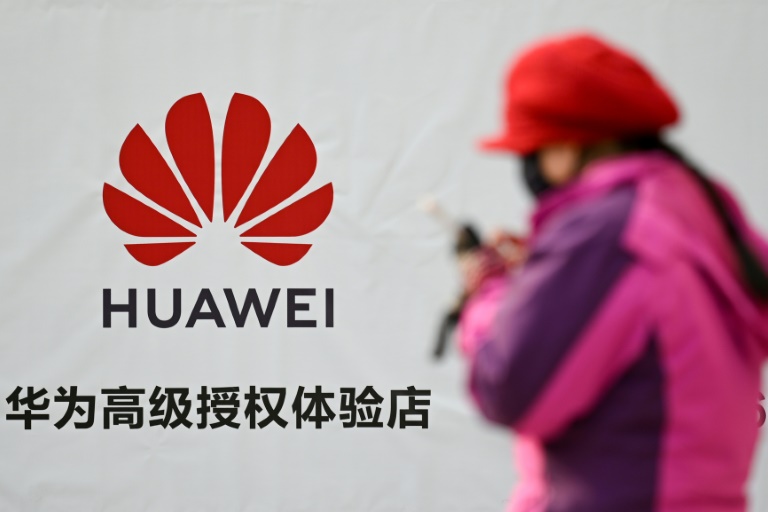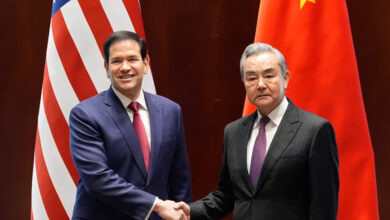
China on Tuesday accused the United States of “political motivations” behind sweeping charges against Chinese telecom giant Huawei in a case that has ratcheted up tensions between the two superpowers.
The Justice Department Monday unveiled 13 charges against Huawei Technologies, its chief financial officer Meng Wanzhou — the daughter of the company’s founder — and two affiliates related to violating US sanctions on Iran.
The firm was also accused of technology theft on the same day China’s top trade negotiator arrived in Washington for high-stakes talks with US officials, possibly complicating the discussions ahead of a March deadline to avert a deepening of their trade war.
Canada has been dragged into the dispute since it arrested Meng at the behest of the United States last month, sparking a diplomatic crisis between Ottawa and Beijing, which renewed calls for her release and for the US to drop its warrant against her.
China’s foreign ministry said there were “strong political motivations and political manipulations” behind the charges.
“For some time, the US has used state power to smear and suppress specific Chinese companies in an attempt to stifle their legitimate business activities,” ministry spokesman Geng Shaung said at a regular briefing.
“We strongly urge the US to stop the unreasonable suppression of Chinese companies including Huawei and to treat them fairly and objectively. China will also resolutely defend the legitimate rights and interests of Chinese enterprises.”
The twin indictments are the latest setback for the company, with its equipment having been barred from domestic networks in the United States, Australia and New Zealand amid security fears.
In addition to fraud charges linked to Iran sanctions violations against Meng and the company, two Huawei affiliates were charged with stealing robot technology from T-Mobile.
“Both sets of charges expose Huawei’s brazen and persistent actions to exploit American companies and financial institutions, and to threaten the free and fair global marketplace,” said FBI Director Christopher Wray.
Acting US Attorney General Matthew Whitaker said there was nothing in the indictment that alleged Chinese government involvement in either case.
However, he added, “As I told Chinese officials in August, China must hold its citizens and Chinese companies accountable for complying with the law.”
In a statement sent to AFP, Huawei said it was “disappointed” and denied that it committed any of the allegations.
It added that it was “not aware of any wrongdoing by Ms Meng (Wanzhou), and believes the US courts will ultimately reach the same conclusion.”
Extradition request
The United States have filed a formal extradition request for Meng, according to Canadian broadcaster CBC, and she faces a court hearing on February 6.
Nine days after her arrest in Vancouver on December 1, Chinese authorities detained two Canadians in what is seen as an act of retaliation to pressure Ottawa.
The charges against Meng, filed in federal court in New York, allege that between 2007 and 2017 she, Huawei and the subsidiaries sought to mask their business with Iran in violation of US and UN sanctions on the country.
Meng in particular “repeatedly lied” to bankers about the relationships between the companies, especially with Skycom, a Huawei affiliate in Iran, according to the charges.
That violated US laws, the Justice Department said, because the Iran business involved US-dollar transactions processed by banks through the United States.
Huawei and the affiliates also lied to US authorities, obstructing the investigation, they said.
The indictment also mentions that Huawei’s founder — Ren Zhengfei, a former People’s Liberation Army engineer identified only as “Individual-1” in the court documents — had “falsely stated” that the company had “not dealt directly with any Iranian company” in an interview with FBI in July 2007.
Ren, however, has not been charged.
‘Stealing’ tech secrets
The second case charged that Huawei made a concerted effort to steal technology related to a phone-testing robot dubbed Tappy from a T-Mobile USA lab in Washington state.
Engineers of Huawei — which was supplying T-Mobile with phones — took pictures and made measurements of parts of the robot, “even stealing a piece of it,” said Whitaker.
The Justice Department charged that the Chinese company had, in July 2013, offered bonuses to employees “based on the value of information they stole from other companies around the world, and provided to Huawei via an encrypted email address.”
The indictments came as Chinese Vice Premier Liu He arrived in Washington on Monday to lead trade talks this week.
Speaking together with Justice Department officials announcing the indictments, US Secretary of Commerce Wilbur Ross said they were “wholly separate from our trade negotiations with China.”
However, he added: “Commerce will continue to work with our interagency partners to protect US national security interests.”




